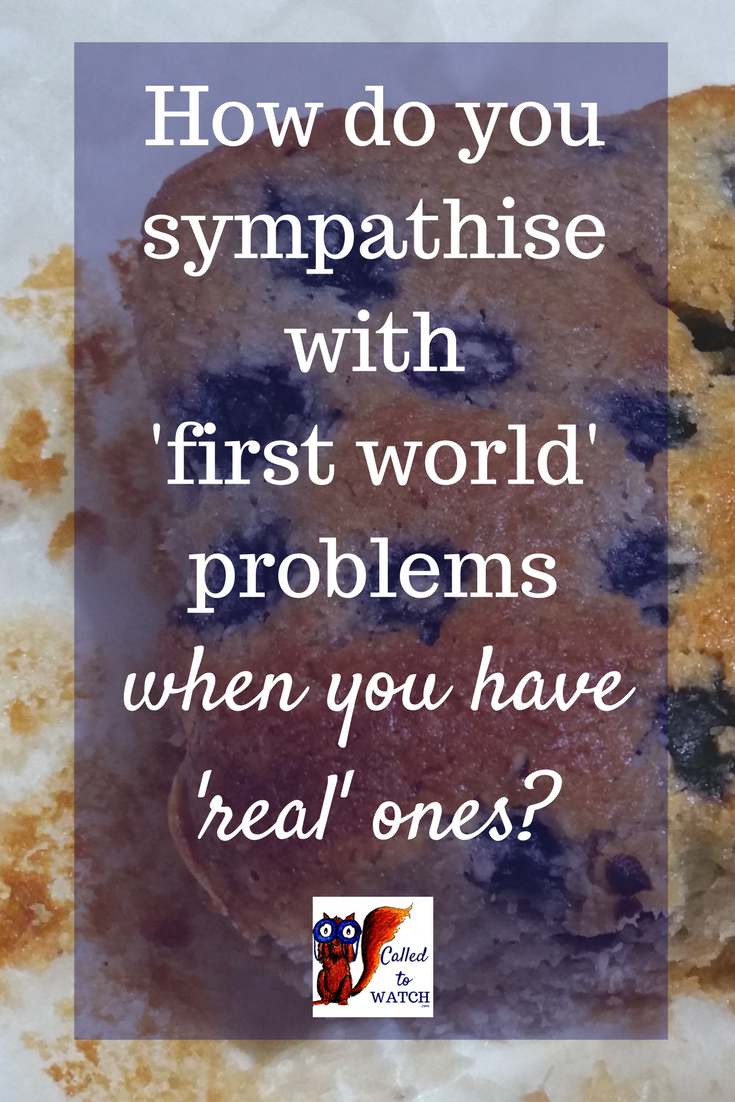These announcements normally evoke an emotional response. We recognise them as huge, world-breaking problems. They are tragedies with capital ‘T’s.
For this reason it is often easier to sympathise with our chronically ill friend, than our whining-about-their-chipped-nails colleague. And yet, we’ve discussed that as humans (and even more so as Christ-followers) we really ought to sympathise with both.
Easy to say.
Hard to do.
What does this look like in practice? How do we possibly leave the bedside of our ill spouse, and turn to our next door neighbour to tut-tut over their dying hydrangeas?
How to sympathise with “first world” problems
The answer to this conundrum boils down to one principle.
We remember.
After all, that’s what sympathy is. An act of remembering.
First of all, we remember reality
Sympathy is not about lying.
It’s not saying “your lost concert tickets are more important than a lost life”. Our decision to sympathise is not a decision to twist reality, or decision to pretend a reaction we do not feel.
Rather, it’s a decision to love.
And so we sympathise by listening patiently to the other person’s recount.
We nod, and we consider, and we try our best to understand, whether we want to or not.
Then we respond.
Sometimes, after listening, our answer will be a genuine, “oh that does sound hard.” It may not be hard in comparison to our own struggles, but that’s not the point. The point is, it’s hard for that person. Acknowledging that is love.
Other times, we may be called to provide perspective. That too is love.
Because we have seen suffering which the other person has not, we may be better equipped to see the greater picture. It’s a delicate juggle to do so without trampling over their real hurts, but sometimes it’s the most loving response.
‘Oh that sounds hard, but it should be over by Friday, right?’
‘I’m thankful it’s only a cold, the doctor said you didn’t need antibiotics, didn’t he?’
‘It’s a pity you can’t go to the concert. I’ve been in similar situations, and it can be really hard to use it as an opportunity to practice being satisfied in Christ, rather than being bitter.’
“Sympathy is not a decision to lie, but a choice to love.”
Secondly, we remember the person
I touched on this above, but I think we need to state it state again.
Our friend’s troubles may (in reality) be ‘unimportant’.
But it is important to them.
And they are important to us.
And so their troubles become ‘important’.
If we remember the living human person in front of us, sympathy becomes easier. But what if we don’t really know them? What if it’s the grocery shop assistant complaining about the busyness of the store?
Thirdly, we remember our rights
We are not entitled to sympathy.
No one is.
And so how dare we withhold our sympathy to another human being? Let us remember this next time someone’s smaller problems make us feel like turning away ‘because why should I give them sympathy when no one ever cares about my own troubles?’
Let us remember this when we are tempted to leave a conversation, because ‘someone else will be a listening ear, but my own struggles are too big to care about theirs’ right now.’
Let us remember this when we find ourselves disregarding another human’s life story, simply because it doesn’t seem to be on par with our own.

Lastly, we remember Christ
We are called to sympathise, because Jesus sympathised first with us. He came down to earth, and wept over the state of our lives while we were incapable of weeping.
It is only in His power that we can ever hope to sympathise.
It is only because He offered understanding to us that we can extend it to others.
And so we remember our undeservedness, and we pray for help.
“For we do not have a high priest who cannot sympathize with our weaknesses, but One who has been tempted in all things as we are, yet without sin.”
Hebrews 4:15
It is only with Jesus’ power that we can ever hope to sympathise. He sympathised first with us, otherwise we could never offer it to others. And so we pray for help and remember our undeserved-ness.
Called to sympathise
It can be hard to sympathise with others over ‘small’ matters, especially if you have felt deep grief and seen immense suffering. And yet, if we are to follow in Christ’s footsteps, we are called to sympathise, just as much as we are Called to Watch.
//Do you find it a struggle to sympathise with people’s ‘first world’ problems? Has this post been helpful? Do you have any thoughts to add?
Comment and join the conversation here!
PS: Enjoyed the post above? Get the next one delivered straight to you! Sign up for email notifications
I’m also on Facebook, Pinterest & Twitter! Meet me there for more interesting reads, resources and community.


This article is so true! Thank you for your wonderful perspective and for sharing it with us 🙂
Thank you for your encouragement Sara! Very glad you found it helpful 🙂